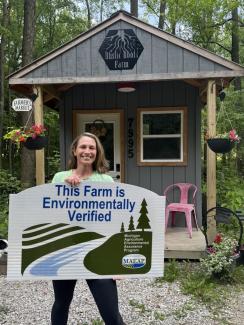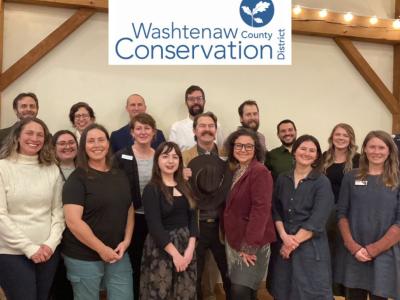
If you’ve been involved with the Washtenaw County Conservation District (WCCD) in the past decade, you probably know Jill Dohner’s name. A longtime board member and past Board President, Jill has helped guide WCCD through growth, transitions, and a renewed focus on serving the next generation of land stewards. Today, she continues that work as a staff member—supporting beginning farmers, promoting conservation practices, and leading the development of MiFarmLink, a resource hub and land-linking tool for Michigan farmers.
Her journey is one of deep roots, intentional transitions, and a belief that the future of agriculture is local, regenerative, and accessible.
From Leadership to Staff: A Full-Circle Commitment
Jill served on WCCD’s Board of Directors for 10 years, including as Chairwoman. Her leadership helped lay the foundation for many of the District’s current initiatives. When the opportunity arose to take a more hands-on role as a staff member, she didn’t hesitate.
“I wanted to do more. I was ready in terms of my own farm and family to be able to accept more responsibility. I knew I had the long-term vision to impact MiFarmLink. After developing a five-year Strategic Plan and taking the program statewide, I've been able to grow the program under the effective leadership of WCCD.”
As part of the team, Jill helped incubate and expand MiFarmLink, a statewide project designed to connect farmland owners with new and aspiring farmers. It’s a crucial bridge in a time when aging landowners are seeking retirement, but many young and underserved farmers lack access to affordable land.
“I knew MiFarmLink was working when I spoke with a farmer out in West Michigan who said they heard about it from their dentist's brother. It hit me that this is starting to be a statewide solution to a real problem—and folks were talking about it. Because we all know farmers talk about solutions that work.”
Farming and Conservation in Practice: Rustic Roots Farm
Jill isn’t just a champion for conservation on paper—she lives it. Alongside her husband, she operates Rustic Roots Farm, a small-scale, sustainable farm in Dexter, Michigan. Their operation is MAEAP Verified (Michigan Agriculture Environmental Assurance Program), a testament to their commitment to soil health, water protection, and land stewardship.
Rustic Roots is home to over 50 beehives, laying hens, a herd of dairy goats, a fruit orchard, vegetable gardens, and a wood shop. The farm’s conservation strategies include compost management of manure, cover cropping, rotational grazing, invasive species removal, and tree planting. Jill has also installed a rain garden and plans to add a ½-acre pollinator garden this fall.
“I’ve been farming for over 15 years in Webster Township, and conservation has always been at the heart of it. We’re trying to build systems that give back more than they take.”
Looking Ahead: Farmland, Farmers, and the Future
Whether she’s advising a beginning farmer, stewarding her own land, or crafting long-term strategies for land access, Jill’s work is always future-focused. She believes that farmland transition, climate adaptation, and equitable access are all deeply connected—and that conservation districts have a central role to play.
“Meeting the next generation of Michigan farmers gives me hope. They’re willing to farm even if they didn’t grow up doing it. Many are learning from universities, other farmers, conservation districts—even YouTube! That’s my vision for MiFarmLink and WCCD: to be the guiding light for farmers to access land and keep local food close to home.”
Quick Picks: Jill’s Conservation Snapshot
- Favorite conservation practice:
Planting trees! I started my career in Detroit planting trees and now I continually plant on my own land year after year. - Most rewarding part of her work:
Helping others through my love of farming. It’s fulfilling. - Favorite season on the farm:
Spring! I love the hustle and bustle and the promise of what’s to come—the thrill of new projects and plantings. Plus, you aren’t weighed down by the weeds yet (literally!). - One resource she recommends to new farmers:
Stamina—and a farm plan. You don’t have to follow it exactly, but it gives you a guiding focus. You can always refine it later.
Local conservation districts play a critical role in protecting our land, water, and farms. Your support can help us continue this essential work during uncertain times. Please consider making a donation to keep conservation on the ground in our community.
